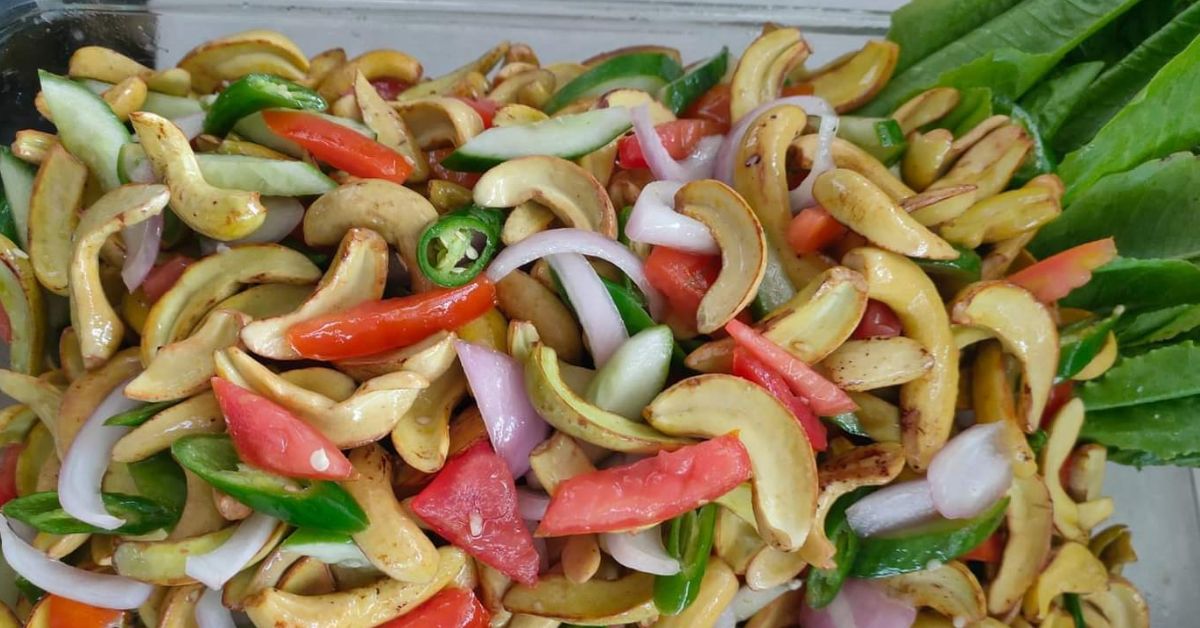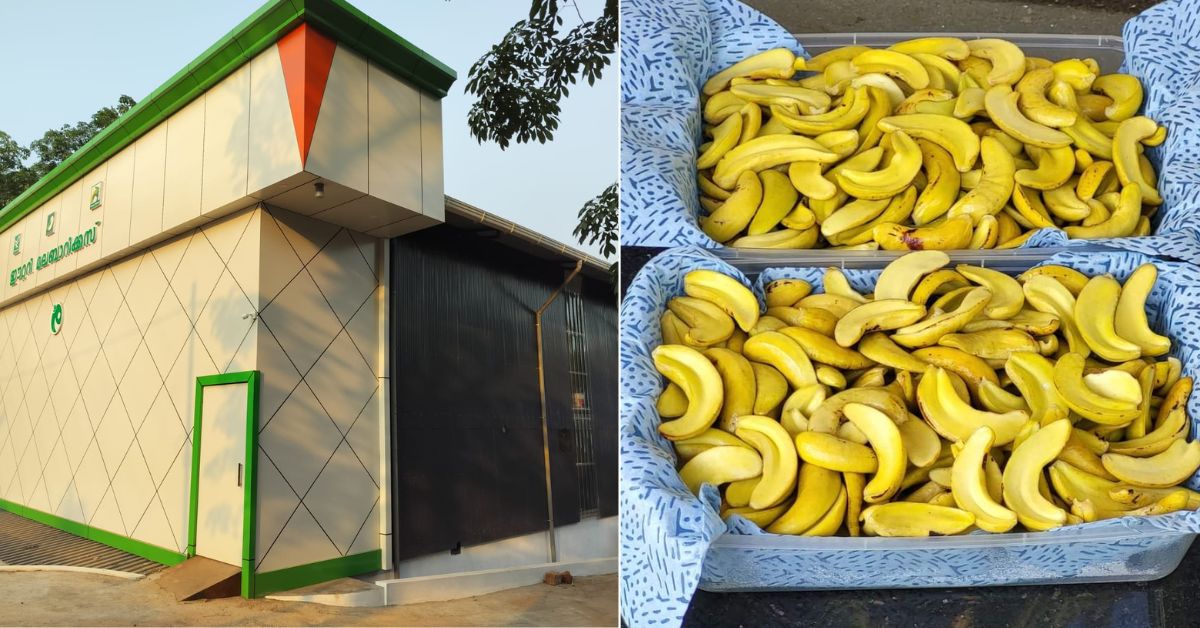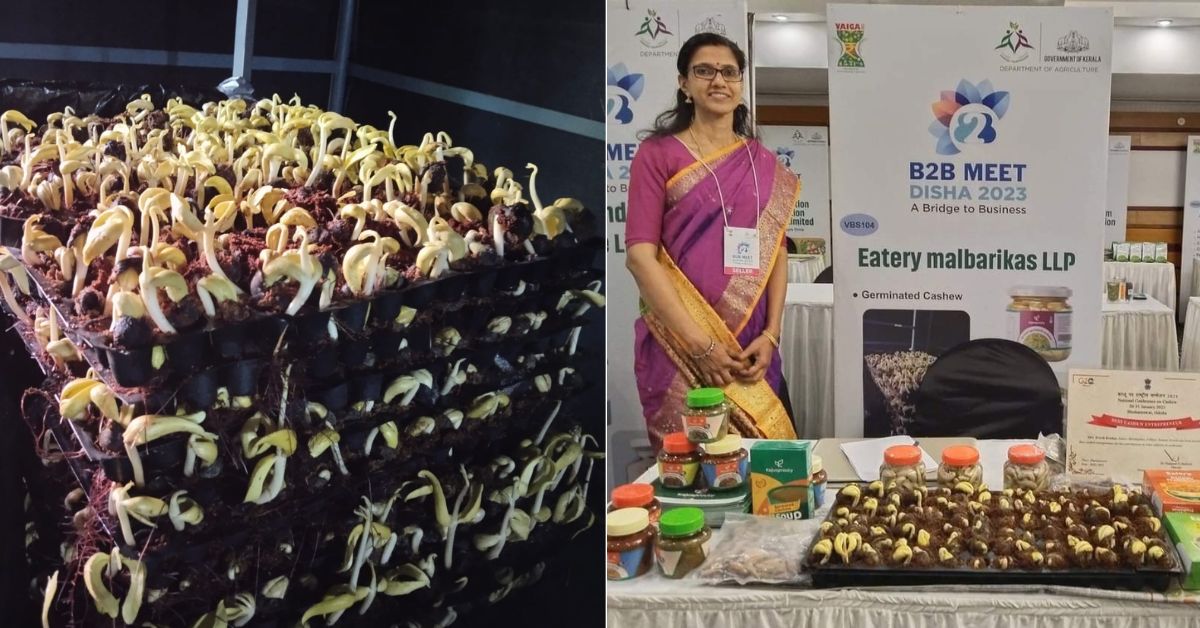A large produce of wet, harvested cashews was in front of Brijith Krishnan. The unseasonal rains in his hometown in Kerala had ruined the crop again. He knew this crop wouldn’t fetch him any income.
Around the same time in 2020, the mechanical engineering diploma holder also faced another challenging turn of events when he unexpectedly lost his job as a supervisor in an IT company.
In addition to this, the cashew farming industry – a traditional source of income for his family – was also on the decline. This double blow left him without a stable income source. He strived to permanently settle in his hometown and explore new avenues.
With a keen eye for innovation and a determination to make a meaningful impact, he observed the growing trend towards plant-based diets, particularly in the vegan industry.
Leveraging his mechanical engineering background and driven by a desire to create value in cashew farming, he delved into the unchartered territory of sprouting technology for cashew nuts.
In 2021, he officially launched his venture, Eatery Malbarikas, which makes dishes from sprouted cashew nuts and supplies to major food supply companies and hotels in Kerala, Bengaluru, Mumbai.

Reality of the largest cashew producers of Kerala
According to the ‘Status of Cashew Research and Development in India: A State Perspective published by the ICAR- Directorate of Cashew Research, Karnataka’, the coastal state of Kerala accounts for 15 percent of cashew production in India. Of this, Kannur district accounts for nearly 63 percent of the total cashew cultivation in the state.
Cashew production is relatively high in Kannur because the region experiences a prolonged dry spell during the reproductive phase of the crop.
Brijith, who hails from the same district and grows cashew on 13 acres of land, shares that cashew productivity has been affected amid unseasonal rain and extreme weather conditions in the last few years.
“We experience unseasonal rains in March-May. This affects the pollination process and the harvesting period. We are small farmers, we don’t have good storage facilities. As a result, we have to keep our harvest out in the open. Most of this produce gets wet in this period then. No cashew factory is ready to purchase this damaged product as its quality becomes poor, colour gets faded, and also has a poor taste,” shares the 47-year-old.

As the conventional practice in cashew farming involves harvesting the nuts for consumption as dry fruits or in a roasted form, there was a limited scope for value addition. “You can dry and store coconut produce and can make mango pulp but there is hardly any alternative to utilise cashews in other forms,” he adds.
Recognising this as a crucial gap in the market, Brijith embarked on a journey of experimentation. He reached out to institutions like Central Food Technological Research Institute (CFTRI) Mysuru, and Kerala Agriculture University to explore the nutritional benefits and viability of sprouting cashews.
After receiving an encouraging response from the institutes, his focus shifted towards refining the sprouting technology for cashews. Recognising the perishable nature of cashews and the challenges in maintaining a cold supply chain, he drew inspiration from Japan’s retorting technology – which involves heat-treating food in airtight containers to extend shelf life.
By adapting this innovative approach, he devised a method to process and store sprouted cashews at room temperature, enhancing their shelf life and market reach.
After a year into research and development, Brijith started his own startup in 2021.
From raw sprouts, pickles to manchurian, soup premix
One of the initial challenges that Brijith tackled was the limited germination potential of cashews. “Due to their seasonal nature, the germination potential of matured cashews was only 90 days. Therefore, year round availability was a big concern. Through persistent research, trials, and development efforts, I successfully extended the germination potential to 180-200 days,” he adds.
After an initial investment of Rs 1 lakh, Brijith secured a grant of Rs 25 lakh from the central government under the Rashtriya Krishi Vikas Yojana (RKVY) scheme that aims at promoting agri-business entrepreneurship. This helped him kickstart the work.

Today, he offers a wide range of value-added products – cashew sprouts Manchurian, cashew sprouts butter masala, cashew sprouts malai, cashew sprouts schezwan, cashew sprouts Malabar masala, cashew sprouts theyal, cashew sprouts soup premix, cashew sprouts brine, pickles, and fresh cashew sprouts.
With a meticulous focus on quality and value, Brijith priced his sprouted cashews at Rs 1,000 per kg. Through strategic partnerships with celebrity chefs, star hotels, and catering groups, Brijith positioned his premium cashew sprout products in a niche market segment.
One of his regular customers Thomas, who works as a corporate chef at Paragon group of restaurants, shares, “We experienced these cashew sprouts can be included in a healthy diet and lots of various dishes can be prepared with adaptability. It is not easily available in stores so people have some curiosity about it. These dishes are repeatedly demanded from our happy customers at the restaurant.”
The unique positioning in the market enabled Brijith to secure a steady clientele and achieve a turnover of Rs 25 lakh in 2023.
Furthermore, his endeavours were not only driven by a passion for innovation but also by a commitment to empower local farmers. By purchasing wet cashews from at least 11 local farmers, Brijith managed to provide a sustainable solution by transforming them into high-quality sprouted cashews.
“By reimagining traditional practices and leveraging modern technology, I not only wanted to revitalise the cashew farming industry but also exemplify the potential for agri-business entrepreneurship to drive economic growth in rural communities. I am glad that we don’t have to worry about wet produce anymore,” he smiles.
Edited by Padmashree Pande; All photos: Brijith Krishnan
No comments:
Post a Comment